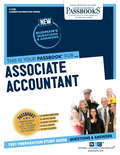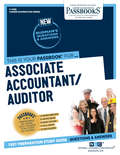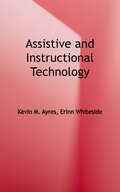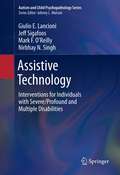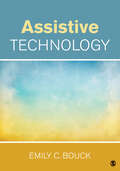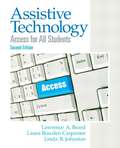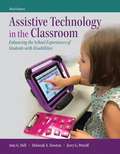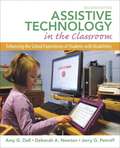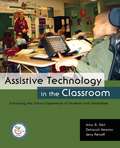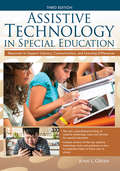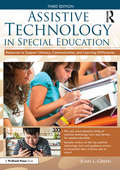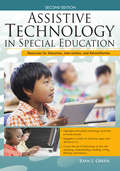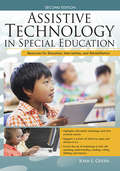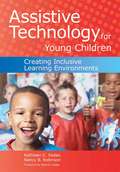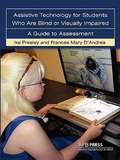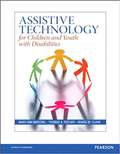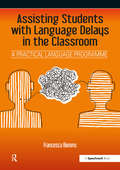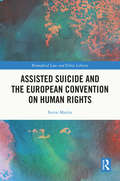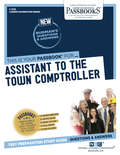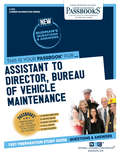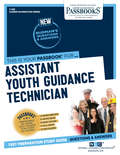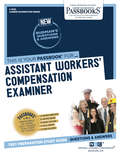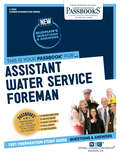- Table View
- List View
Associate Accountant: Passbooks Study Guide (Career Examination Series #C-1798)
by National Learning CorporationThe Associate Accountant Passbook® prepares you for your test by allowing you to take practice exams in the subjects you need to study. It provides hundreds of questions and answers in the areas that will likely be covered on your upcoming exam, including but not limited to: accounting and auditing principles and practices; maintenance, examination and review of financial books, records and transactions; financial statement budgets and supporting documents and schedules, interpretation and understanding of financial written material; and more.
Associate Accountant-Auditor: Passbooks Study Guide (Career Examination Series)
by National Learning CorporationThe Associate Accountant/Auditor Passbook® prepares you for your test by allowing you to take practice exams in the subjects you need to study. It provides hundreds of questions and answers in the areas that will likely be covered on your upcoming exam, including but not limited to: General accounting; General auditing; Governmental accounting; Preparing reports and official documents; Supervision; Understanding and interpreting tabular material; and more.
Assistive and Instructional Technology
by Kevin M. Ayres Erinn WhitesideAssistive and Instructional Technology is a guide to using technology in the classrooms of students with autism spectrum disorder. This book describes the difference between assistive and instructional technology and how they are related. It identifies key features to look for in new technology and provides step-by-step support for using it effectively. This succinct resource describes critical aspects of current technology that result in improved learning outcomes.
Assistive Technology: Interventions for Individuals with Severe/Profound and Multiple Disabilities (Autism and Child Psychopathology Series)
by Mark F. O'Reilly Jeff Sigafoos Nirbhay N. Singh Giulio E LancioniFor people with severe/profound and multiple disabilities, managing the basic necessities of daily life often poses myriad challenges. Despite great odds, advances in assistive technology are making a difference in these individuals' lives. Advances in microswitches, voice outcome communication aids, and computer-based systems are creating new opportunities for living independently, improving basic life skills, and reducing problem behaviors among individuals with combined motor, sensory, and intellectual disabilities. This unique volume examines how education and rehabilitation can improve the lives of even those individuals most affected by severe/profound and multiple disabilities. Interventions currently in use and in experimental stages are surveyed in terms of how they work and their applicability to clients with various needs. In addition, it examines the characteristics of developmentally disabled populations and offers guidelines for choosing suitable technologies. It presents empirical evidence on the advances in improving interaction with caregivers, control of the home environment, handling self-care tasks, and other core skills. Assistive Technology examines interventions that are innovative, respectful of the dignity of clients, and practical for ongoing use, including: * Microswitches in habilitation programs. * Speech-generating devices for communication and social development. * Instructional technology for promoting academic, work, and leisure skills. * Assistive technology for promoting ambulation. * Orientation systems for promoting movement indoors. * Assistive technology for reducing problem behaviors. A state-of-the-art guide to a growing field, Assistive Technology is an invaluable resource for researchers, clinicians, graduate students as well as clinicians and allied professionals in developmental psychology, rehabilitation and rehabilitative medicine, learning and instruction, occupational therapy, speech-language pathology, and educational technology.
Assistive Technology: Gargiulo: Special Education In Contemporary Society 5e + Bouck: Assistive Technology
by Emily C. BouckSuccinct, yet comprehensive, Assistive Technology is designed to help educators better understand assistive technology and how it can support students with disabilities from early childhood through the transition into adulthood. This practical book is organized around the purpose of technology and the support it can provide rather than a student’s disability categorization. Grounded in research and filled with engaging case studies and activities, author Emily C. Bouck offers an unbiased depiction of the advantages and limitations of technology. Readers are exposed to a full range of assistive technology including up-to-date coverage of low- and high-technology, as well as free and for-purchase options that can be used to support students with disabilities.
Assistive Technology: Gargiulo: Special Education In Contemporary Society 5e + Bouck: Assistive Technology
by Emily C. BouckSuccinct, yet comprehensive, Assistive Technology is designed to help educators better understand assistive technology and how it can support students with disabilities from early childhood through the transition into adulthood. This practical book is organized around the purpose of technology and the support it can provide rather than a student’s disability categorization. Grounded in research and filled with engaging case studies and activities, author Emily C. Bouck offers an unbiased depiction of the advantages and limitations of technology. Readers are exposed to a full range of assistive technology including up-to-date coverage of low- and high-technology, as well as free and for-purchase options that can be used to support students with disabilities.
Assistive Technology: Access For All Students
by Lawrence A. Beard Linda B. Johnston Laura Bowden CarpenterOrganized around the theme of universal design, this guide to assistive technology discusses the knowledge and skills educators need to know in order to determine the appropriate use of technology and services to meet the needs of individuals with disabilities. The text provides an overview and introduction to the topic of assistive technology, evaluating various technologies for classroom use, and using assistive technology with special needs students of a diverse range of disabilities, including the young child with special needs, students with high incidence disabilities, positioning and mobility for students with physical disabilities, students with communication disorders, and sensory impairments. It further discusses AT in relation to transitioning, distance learning, and the ethical standards of practice. The new edition has been thoroughly updated to reflect the most recent AT beneficial to students requiring such special accommodations, including links to websites of current AT devices, and software for use in the classroom, and a new chapter on Universal Design for Learning and Response to Intervention and how to combine the two techniques to provide students with access to the general education curriculum. This edition also features more on ethics and assistive technology use for consideration of all students, new chapter introductions, questions for reflection, end-of-chapter review material, and extended coverage of diversity related to assistive technology and the classroom. Designed to provide useful information and strategies for candidates in teacher education programs and those practicing educators, the book is also useful to and any other professional or layperson interested in assistive technology and learning for all students.
Assistive Technology in the Classroom: Enhancing the School Experiences of Students with Disabilities (Third Edition)
by Amy G. Dell Deborah A. Newton Jerry G. PetroffWith an emphasis on the integration of assistive technology into the curriculum, this text focuses on how assistive technology can be used in schools to enhance the teaching and learning of students with disabilities. This link between technology and teaching and learning drives the book's organization as well as its content. It is organized by school-related tasks that students must perform on a daily basis to be successful -- reading, writing, practicing academic skills, and communicating with their teachers and peers – and presents descriptions of technology-based solutions to the obstacles students with disabilities face in completing these tasks. Since being able to access computers is one major barrier, the text features a section on making computers accessible to students with a wide range of disabilities. A companion web site offers up-to-date information on product names, vendors, web site addresses, and other time-sensitive material.
Assistive Technology in the Classroom: Enhancing the School Experiences of Students With Disabilities (Second Edition)
by Amy G. Dell Deborah A. Newton Jerry G. PetroffThe book takes a look at the most effective uses of assistive technology for students with disabilities that emphasizes the link between technology and learning.
Assistive Technology in the Classroom
by Amy G. Dell Deborah A. Newton Jerry G. PetroffWith an emphasis on the integration of assistive technology into the curriculum, this text focuses on how assistive technology can be used in schools to enhance the teaching and learning of students with disabilities.
Assistive Technology in Special Education: Resources to Support Literacy, Communication, and Learning Differences
by Joan GreenAssistive Technology in Special Education presents a wealth of practical, well-organized information to help families, teachers, and therapists find effective solutions for students with learning, literacy, and cognitive challenges. This third edition features new affordable tools to improve and compensate for challenges related to speaking, understanding, reading, writing, and thinking and remembering, as well as strategies to help students become more organized and efficient. Also highlighted are iDevices, G Suite (Google Apps and Extensions), online collaborative sites, and features built into the computers and mobile devices readers already use. As technology changes and new operating systems make older programs obsolete, this book will empower readers to explore the most current resources as they become available.
Assistive Technology in Special Education: Resources to Support Literacy, Communication, and Learning Differences
by Joan L. GreenAssistive Technology in Special Education presents a wealth of practical, well-organized information to help families, teachers, and therapists find effective solutions for students with learning, literacy, and cognitive challenges. This third edition features new affordable tools to improve and compensate for challenges related to speaking, understanding, reading, writing, and thinking and remembering, as well as strategies to help students become more organized and efficient. Also highlighted are iOS devices, G Suite (Google Apps and Extensions), online collaborative sites, and features built into the computers and mobile devices readers already use. As technology changes and new operating systems make older programs obsolete, this book will empower readers to explore the most current resources as they become available.
Assistive Technology in Special Education: Resources for Education, Intervention, and Rehabilitation
by Joan GreenFamilies, teachers, and therapists who are searching for an update about how to use the latest technologies to help individuals who struggle with communication, literacy, and learning will benefit from the wealth of practical, well-organized information in this second edition of Assistive Technology in Special Education. The indexed update presents an overview of the uses of technologies to help readers zero in on specific, powerful, cutting-edge resources they can use to enhance success. The book features new tools to improve and compensate for challenges relating to speaking, understanding, reading, writing, thinking and remembering, as well as strategies to help students become more organized and efficient. The use of tablets such as the iPad and smartphones, as well as cloud-based products, are highlighted. Online resources and social networking tools are presented to empower readers to learn about new products as they become available.
Assistive Technology In Special Education: Resources for Education, Intervention, and Rehabilitation (Second Edition)
by Joan GreenFamilies, teachers, and therapists who are searching for an update about how to use the latest technologies to help individuals who struggle with communication, literacy, and learning will benefit from the wealth of practical, well-organized information in this second edition of Assistive Technology in Special Education. The indexed update presents an overview of the uses of technologies to help readers zero in on specific, powerful, cutting-edge resources they can use to enhance success. The book features new tools to improve and compensate for challenges relating to speaking, understanding, reading, writing, thinking and remembering, as well as strategies to help students become more organized and efficient. The use of tablets such as the iPad and smartphones, as well as cloud-based products, are highlighted. Online resources and social networking tools are presented to empower readers to learn about new products as they become available.
Assistive Technology For Young Children: Creating Inclusive Learning Environments
by Kathleen Curry Sadao Nancy B. RobinsonThis book appeals to the needs of a wide range of readers who seek to increase their technology competencies in order to improve access to learning for children with disabilities.
Assistive Technology For Students Who Are Blind or Visually Impaired: A Guide to Assessment
by Frances Mary D'Andrea Ike PresleyAssistive technology is essential in todays world to enable people who are blind or visually impaired to participate fully in school, work, and life. But which assistive technology tools are right for your students? This comprehensive handbook is the essential resource for teachers of students with visual impairments, administrators, technology professionals, and anyone who needs to keep up with the ever-changing world of technology. Assistive Technology For Students Who Are Blind or Visually Impaired: A Guide to Assessment contains a wealth of technical information translated into clear, user-friendly terms, including: An overview of the full range of assistive technology that students can use to manage information in print or electronic formats-whether they use vision, touch or hearing to access information How to select appropriate tools and strategies A structured process for conducting a technology assessment Detailed assessment forms that can be used to determine students technology needs and solutions to address them Advice on writing up program recommendations based on assessment results Reproducible, blank assessment forms
Assistive Technology For Children And Youth With Disabilities
by Mary Ann Marchel Denise M. Clark Thomas A. FischerEncompassing home, school and community environments, Assistive Technology for Children and Youth with Disabilities highlights the vast amount of supports available for children with disabilities from birth to age 21. An informative resource, the text details not only what types of assistive technology exist, but also how to select technology to meet specific students needs and match specific environmental circumstances. Chapters address the broad range of technologies now available, including supports for mobility, positioning, access, academic areas, behavior problems, recreation, and transitioning. Case examples, vignettes and activities provide practical, real-life examples that show how to use assistive technology to improve the independence and participation of students with special needs.
Assistive Solutions CTB_Nov 2018
by Enable IndiaThis book aims to present a variety of solutions designed, developed and adapted to broaden the horizons for persons with a disability. A solution can be anything from a simple, creative alternative to a nifty, technological gadget that can change the lives of thousands.
Assisting Students with Language Delays in the Classroom: A Practical Language Programme
by Francesca Bierens'Assisting Students with Language Delays in the Classroom' is a structured language programme designed for teachers and SENCOs to use in the classroom with children and adolescents with a range of language abilities. This resource caters to the needs of a broad range of students who require assistance with their language development, from the pre-verbal skills of language, progressing through to the skills required for effective, interactive conversation. The resource is accordingly structured within three key sections: the Pre-Verbal Skills of Language; the Building Bricks of Language; and the Skills of Conversation. Features: step-by-step instructions; language charts 200+ activities and exercise. Francesca Bierens is a Qualified Speech and Language Therapist and Primary School Teacher with over 33 years experience working with children with speech and language delays and/or disorders, in the Education, Health and Private sectors.
Assisted Suicide and the European Convention on Human Rights (Biomedical Law and Ethics Library)
by Stevie MartinLocating assisted suicide within the broader medical end-of-life context and drawing on the empirical data available from the increasing number of permissive jurisdictions, this book provides a novel examination of the human rights implications of the prohibition on assisted suicide in England and Wales and beyond. Assisted suicide is a contentious topic and one which has been the subject of judicial and academic debate internationally. The central objective of the book is to approach the question of the ban’s compatibility with the European Convention on Human Rights afresh; freed from the constraints of the existing case law and its erroneous approach to the legal issues and selective reliance on empirical data. The book also examines the compatibility of the ban on assisted suicide with rights which have either been erroneously disregarded or not considered by either the domestic courts or the European Court of Human Rights. Having regard to human rights jurisprudence more broadly, including in the context of abortion, the research and analysis undertaken here demonstrates that the ban on assisted suicide violates the rights of a significant number of individuals to life, to freedom from torture or inhuman or degrading treatment and to private life. Such analysis does not depend on a strained or contrived approach to the rights at issue. Rather, the conclusions flow naturally from a coherent, logical application of the established principles governing those rights. While the focus of the book is the Suicide Act 1961, the conclusions reached have implications beyond England and Wales, including for the other devolved jurisdictions and international jurisdictions. Beyond courts and legislators, it will be a valuable resource for students of human rights and medical law, as well as medical and legal practitioners and academics working in human rights and end-of-life care.
Assistant to the Town Comptroller: Passbooks Study Guide (Career Examination Series)
by National Learning CorporationThe Assistant to the Town Comptroller Passbook® prepares you for your test by allowing you to take practice exams in the subjects you need to study. It provides hundreds of questions and answers in the areas that will likely be covered on your upcoming exam.
Assistant to Director, Bureau of Vehicle Maintenance: Passbooks Study Guide (Career Examination Series)
by National Learning CorporationThe Assistant to Director, Bureau of Vehicle Maintenance Passbook® prepares you for your test by allowing you to take practice exams in the subjects you need to study. It provides hundreds of questions and answers in the areas that will likely be covered on your upcoming exam.
Assistant Youth Guidance Technician: Passbooks Study Guide (Career Examination Series)
by National Learning CorporationThe Assistant Youth Guidance Technician Passbook® prepares you for your test by allowing you to take practice exams in the subjects you need to study. It provides hundreds of questions and answers in the areas that will likely be covered on your upcoming exam.
Assistant Workers' Compensation Examiner: Passbooks Study Guide (Career Examination Series)
by National Learning CorporationThe Assistant Workers' Compensation Examiner Passbook® prepares you for your test by allowing you to take practice exams in the subjects you need to study. It provides hundreds of questions and answers in the areas that will likely be covered on your upcoming exam, including but not limited to: Public contact principles and practices; Understanding and interpreting tabular material; Understanding and interpreting written material; and more.
Assistant Water Service Foreman: Passbooks Study Guide (Career Examination Series #C-2924)
by National Learning CorporationThe Assistant Water Service Foreman Passbook® prepares you for your test by allowing you to take practice exams in the subjects you need to study. It provides hundreds of questions and answers in the areas that will likely be covered on your upcoming exam.
